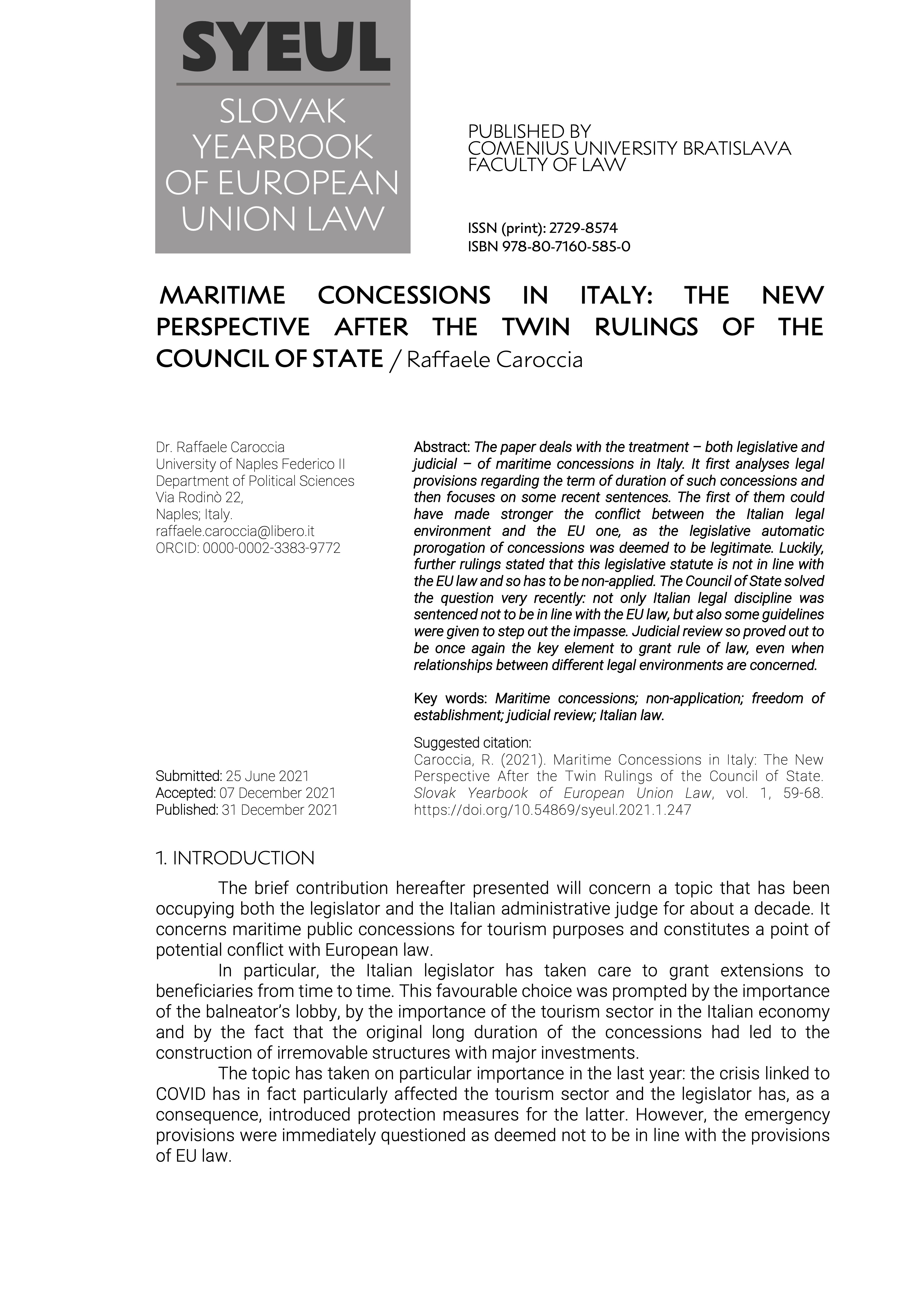Maritime Concessions in Italy
The New Perspective After the Twin Rulings of the Council of State
DOI:
https://doi.org/10.54869/syeul.2021.1.247Keywords:
Maritime concessions, non-application, freedom of establishment, judicial review, Italian lawAbstract
The paper deals with the treatment – both legislative and judicial – of maritime concessions in Italy. It first analyses legal provisions regarding the term of duration of such concessions and then focuses on some recent sentences. The first of them could have made stronger the conflict between the Italian legal environment and EU one, as the legislative automatic prorogation of concessions was deemed to be legitimate. Luckily, further rulings stated that this legislative statute is not in line with EU law and so has to be non applied. The Council of State solved the question very recently: not only Italian legal discipline was sentenced not to be in line with the EU law, but also some guidelines were given to step out the impasse. Judicial review so proved out to be once again the key element to grant rule of law, even when relationships between different legal environments are concerned.
References
Agusto, S. (2020). Gli incostanti approdi della giurisprudenza amministrativa sul tema delle concessioni del demanio marittimo per finalità turistico-ricreative. Rivista Italiana Di Diritto Pubblico Comunitario, (5), 625.
Armenante, F. (2020). La non disciplina delle concessioni demaniali: dall’abrogazione dell’innaturale diritto di insistenza alle plurime e asistematiche proroghe anticomunitarie. Rivista Giuridica Dell’Edilizia, (4), 261.
Bello, F. P. (2021). Primissime considerazioni sulla “nuova” disciplina delle concessioni balneari nella lettura dell’Adunanza Plenaria del Consiglio di Stato. Giustizia Insieme. Retrieved from https://www.giustiziainsieme.it/it/diritto-e-processo-amministrativo/2037-primissime-considerazioni-sulla-nuova-disciplina-delle-concessioni-balneari-nella-lettura-dell-adunanza-plenaria-del-consiglio-di-stato (accesed on 06.12.2021).
Benetazzo, C. (2016). Il regime giuridico delle concessioni demaniali marittime tra vincoli U.E. ed esigenze di tutela dell’affidamento. Federalismi.It. Retrieved from https://www.federalismi.it/nv14/articolo-documento.cfm?Artid=33043 (accesed on 06.12.2021).
Dipace, R. (2021). All’Adunanza Plenaria le questioni relative alla proroga legislativa delle concessioni demaniali marittime per finalità turistico-ricreative. Giustizia Insieme. Retrieved from https://www.giustiziainsieme.it/it/diritto-e-processo-amministrativo/1861-all-adunanza-plenaria-le-questioni-relative-alla-proroga-legislativa-delle-concessioni-demaniali-marittime-per-finalita-turistico-ricreative (accesed on 06.12.2021).
Giannelli, A. (2017). Contributo in tema di compatibilità tra logica pro-concorrenziale e principi di diritto interno in tema di gestione dei beni pubblici. Naples: Editoriale Scientifica.
Magri, M. (2016). «Direttiva Bolkestein» e legittimo affidamento dell’impresa turistico balneare: verso una importante decisione della corte di giustizia U.E. Rivista Giuridica Dell’Edilizia, (4), 359.
Sandulli, M. A. (2021). Per la Corte Costituzionale non c’è incertezza sui termini per ricorrere nel rito appalti: la sentenza n. 204 del 2021 e il creazionismo normativo dell’Adunanza Plenaria. Federalismi.It. Retrieved from https://www.federalismi.it/nv14/articolo-documento.cfm?Artid=46227&content=Per%2Bla%2BCorte%2Bcostituzionale%2Bnon%2Bc’è%2Bincertezza%2Bsui%2Btermini%2Bper%2Bricorrere%2Bnel%2Brito%2Bappalti%3A%2Bla%2Bsentenza%2Bn%2E%2B204%2Bdel%2B2021%2Be%2Bil%2Bcreazionismo%2Bnormativo%2Bdell’Adunanza%2Bplenaria&content_author=%3Cb%3EMaria%2BAlessandra%2BSandulli%3C%2Fb%3E (accesed on 06.12.2021).

Downloads
Published
Issue
Section
License
Copyright (c) 2021 Slovak Yearbook of European Union Law

This work is licensed under a Creative Commons Attribution-NonCommercial 4.0 International License.
The Author(s) transfers copyright to the Article to the Publisher of the Journal by the Licence Agreement.
The Author(s) retains rights specified in the Licence Agreement.
The readers may read, download, copy, distribute, print, search, or link to the full texts of all of the Article of the Journal and use them for any other lawful purpose under specified Creative Commons Licence (CC BY-NC).

